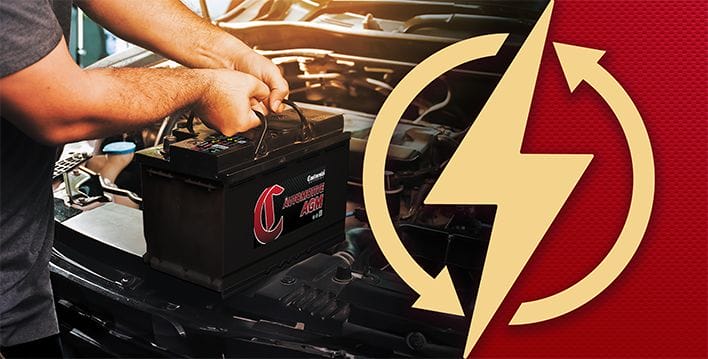
Tractors are hard-working pieces of equipment that experience a lot of bumps, shocks and extreme weather changes as they chug along in the field. With all these impacts, tractor batteries need to be pretty durable. Still, you may be wondering how long tractor batteries last. After all, the lifespan of a tractor battery is important so that you’ll know when it’s time to replace a spent battery.
As it turns out, the lifespan of tractor batteries can vary widely depending on many factors, including the type of battery and how well it is maintained.
Tractor Battery Lifespan
The lifespan of a tractor battery averages around six to eight years, but the actual time will depend on the type of battery. Many tractors will have lead-acid batteries, but absorbent glass mat (AGM) and lithium-ion batteries are also becoming popular options for modern machinery.
Lead-Acid Batteries. A typical lead-acid battery for tractors will last about three to five years.
AGM Batteries. AGM batteries can better withstand extreme temperatures and heavy vibrations compared to traditional lead-acid batteries. Heavy-duty tractor batteries with the AGM design may last six to ten years with proper maintenance.
Lithium-Ion Batteries. When properly stored and cared for, lithium-ion batteries for smaller equipment, like compact tractors or power tools, will last a minimum of five years but could last more than a decade. This battery type can be especially vulnerable to cold temperatures, so storing vehicles or equipment in winter months is crucial for getting the most out of the battery.
Additional factors, like climate and ongoing maintenance, can also impact the battery. While tractor batteries are built to withstand some rugged terrain and less-than-pleasant weather, leaving the tractor out in extremely high or low temperatures or failing to clean corrosion off the battery can also shorten the lifespan of a battery.
Why Does My Tractor Battery Keep Dying?
If the tractor battery is dying often, there could be a number of culprits. There could be a light left on that drains the energy when the tractor isn’t in use, or the battery could simply be near the end of its lifespan. Here are a few common reasons why a tractor battery keeps dying:
Parasitic Draw. Just like when one leaves on the dome light in a car, leaving accessories turned on in a tractor can draw power from the battery. Users should double-check that all electronics, such as lights or radio, are fully off before parking the vehicle.
Age. No battery is going to last forever. Sometimes, even with regular maintenance and care, the tractor battery will naturally reach the end of its lifespan. As its power dwindles, it may die more and more frequently, signaling that it’s time for a replacement.
Loose Connections. After cleaning corrosion from the battery or during regular battery inspections, it’s important to check that the connections to the battery posts are tight. If the battery connections become loose, the battery will work less efficiently and drain faster.
Damage. Batteries can experience physical damage that not only kills off the battery but also can lead to dangerous chemical or gas leaks from the battery. Overcharged batteries can bulge and even crack, and any impact on the battery could also lead to damage.
Signs of a Dying Tractor Battery
You don’t have to wait to get a call from a customer that their rental lawn and garden equipment won’t start up to know that a tractor battery is dying. There are signs to keep an eye out for, so you can replace struggling batteries before a customer is stuck without a working machine.
Tractor Struggles to Start. When the tractor takes a long time to start or sputters a few times before the engine turns over and powers up the vehicle, it could mean the battery has lost power and is dying. While it may still turn on eventually, if the battery is dying, the tractor will become less and less reliable at starting up.
The Accessories Won’t Turn On. While the tractor may still start up, the dying battery may cause problems for the tractor’s electrical accessories. The radio may not turn on, or the lights may dim or flicker. This could mean the tractor battery is on its way out.
Poor Voltage Reading. Testing a tractor battery can help determine if the battery is dying. It’s best to test the battery voltage regularly, about twice per year. If the voltage reading is low, under six volts for a 6-volt battery (which is fully charged at around 6.3 to 6.4 volts) or under 12.2 volts for a 12-volt battery, it could mean the battery is dying and needs to be replaced soon.
Corrosion or Damage. Corrosion can naturally build up around the battery terminals. While this buildup is easy to clean, it can become a real issue if neglected. Corrosion can cause more resistance to the electrical circuit, which can cause the battery to start dying prematurely and can even cause further issues to the tractor’s electrical systems. You’ll want to check the battery for corrosion at least every 6 months, and if you see any corrosion, clean it immediately.
Tractor Battery Maintenance Tips
No one wants to end up stuck in the middle of a field with a dead battery, nor do they want to delay the start of a long harvest day with a tractor that won’t start up. Fortunately, there are some ways to ensure a tractor battery lasts as long as possible. With regular inspections and battery tests, it’s easy to identify a dying tractor battery and replace it before it causes any work delays.
Test Battery Voltage. Testing the battery voltage regularly, about twice per year or before and after putting equipment away for winter storage, can help keep tabs on the life of the battery. Make sure to use a multimeter or voltmeter that is equipped for the battery voltage at hand.
For example, make sure to set the multimeter higher than the voltage, such as setting it up to 20 volts, before getting a reading for an 8-volt battery. In this instance, the 8-volt battery should read about 8.5 to 8.8 when fully charged. If the readings are low, it may be time to check for damage or go ahead and replace the battery.
Recharge the Battery. It’s not just electric batteries that need to be recharged; even traditional flooded batteries need a recharge once in a while. Batteries are recharged by a vehicle’s alternator as the vehicle runs, but you may need to recharge the battery before or after storing the tractor away for the off-season. You can fill the tractor battery charge by connecting it to a trickle battery charger for about 12 to 24 hours.
Clean Off Corrosion. Because corrosion can prevent the battery from running efficiently, it’s important to clean off any buildup before it causes serious and expensive problems to the battery and the vehicle. Be sure to wear protective gear, then carefully disconnect and remove the battery from the tractor before cleaning. The corrosion can be removed with a rag dipped in a paste made from baking soda and water.
Store the Battery Properly. Taking care of the battery in the off months is just as important as refilling the electrolyte and turning off the electronics when the tractor is used daily in the spring through fall harvest. Keeping a battery in the tractor can cause a slow battery drain, and the rate of discharge is even worse if the tractor is stored at freezing temperatures. It’s best to remove the battery and store it on a flat, stable surface away from heat or light, ideally at a temperature of 50°F to 60°F.
Even with proper storage, the battery will discharge at about 1% per day. Charging the battery fully before storing it can help prevent a dead battery, but you may also want to connect the battery to a smart charger when it is in storage. The smart charger can recharge the battery as needed without overcharging the battery, so when the spring comes again, the battery is fully charged and ready to go.
With all of these tips in mind, you can spot (and replace) an aging battery before it leaves riders stranded mid-field with more to plant, fertilize or harvest. Plus, keeping up with maintenance will ensure you get the most life out of the battery, no matter what type. If you have trouble finding the right battery for your equipment, contact Continental Battery Systems today.






